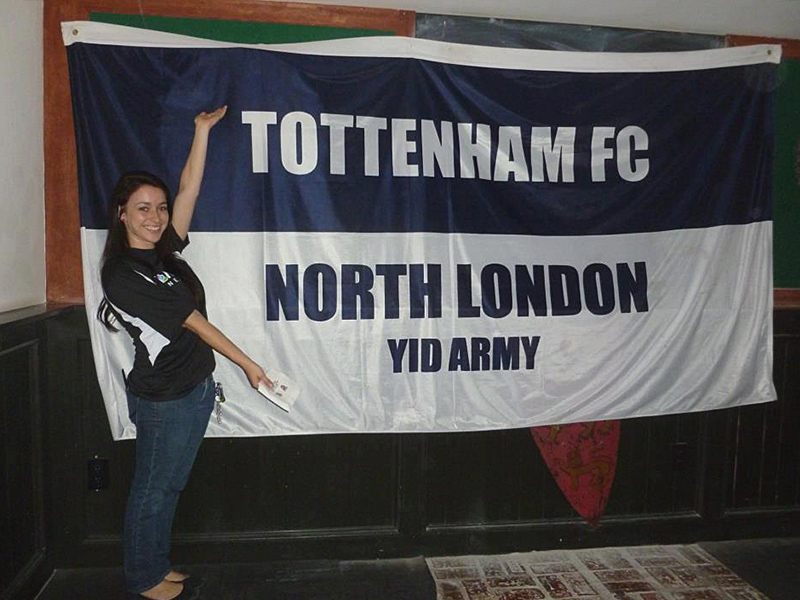The English soccer team Tottenham Hotspur, also known as Spurs, is currently experiencing its best season since 1961. The team may well win the Premiership – the top English soccer league and arguably the best in the world – and are considered by experts to be one of the most exciting sides currently playing. They’ve always been a big, wealthy, North London club, but this year’s run to the top of the table is something exceptional. As such, they are on live television almost every week, watched by hundreds of millions of people in every continent.
But what most people don’t realize is that Tottenham is known as “The Jewish team,” and if you listen carefully, you will hear their fans chanting, “Yids, Yids” or “Yid Army, Yid Army” during their team’s matches.
Offensive? Anti-Semitic? Outrageous? Well, just hold on one moment.

I’ve been a fan of the team for 50 years, largely because my Jewish father was born nearby. Tottenham always had a large number of Jewish supporters, because the catchment area for the club has a sizeable Jewish community. Yet until relatively recently, there were no Jewish owners of the team, and over the years, there has been only one Jewish manager (or coach) and perhaps three or four Jewish players. The latter isn’t surprising, in that there are very Jewish managers anyway, and until Israelis started joining European leagues, not many Jews played first-class soccer. But Spurs was always considered Jewish, and from the 1970s, the identification became rigid, for friends as well as enemies.
The point of transition is layered in irony and centres around a television show called Till Death Us Do Part, the inspiration for the American comedy All In The Family. The anti-hero was the character Alf Garnett, a racist and a bigot who followed east London’s West Ham United team and disliked almost everyone, including Tottenham and “the Jews up at Spurs.” So popular was the show that the Spurs as a Jewish club idea became glued to the wider culture. Garnett, of course, was the symbol of all that was wrong, stupid and undesirable, but nevertheless, his opinions had a certain appeal to some. The irony was that Alf Garnett was played, superbly, by the Jewish actor and lifelong Tottenham fan Warren Mitchell.
Suddenly what was beneath the surface became more visible, even acceptable. Tottenham’s main local rival has always been Arsenal, which is the other London team followed by the Jewish community (in fact, there could very well be more Jewish Arsenal fans than Spurs fans). But Arsenal supporters took up the “Jewish Tottenham” theme as well, and soon Spurs were known as “The Yids.” With Arsenal, it was often mere banter and provocation – some of the Arsenal fans using the epithet were themselves Jewish. But with two other London teams, the motivation was more sinister.
READ: ISRAELI SOCCER PLAYER TRYING OUT FOR THE NFL
In the 1970s, the far right in Britain made a concerted attempt to recruit among soccer hooligans. Groups such as the National Front and British Movement, always small and never a genuine political threat, nevertheless caused trouble and were vocal and visible. At Chelsea and West Ham, they had some success. At Chelsea, in particular, there was an organized fascist minority, and when they shouted, “Yids, Yids,” they meant it. Worse, they also sang, “We’ve never felt more like gassing the Jews,” and even during a Spurs game against Chelsea made hissing sounds that were supposed to indicate the noise of Nazi gas chambers.
Such obscenities have been illegal for some years, and, anyway, the far right dribbled away and such a hateful culture, always the preserve of a fringe extreme, simply doesn’t exist anymore in English soccer. So now it’s almost unheard of for anybody else in a stadium other than Tottenham supporters to chant “Yids.” Spurs fans have owned the word, taken possession of it and refused to give it up. They have even occasionally waved Israeli flags. (This phenomenon is not, by the way, confined to England, and it’s particularly common in the Netherlands, where the famous Ajax of Amsterdam in considered a Jewish team.)
It’s all rather contrived and artificial, and nothing like as visceral and political as the Glasgow division between overwhelmingly Protestant Rangers and Catholic Celtic, but it still divides opinion. There are many people, including the Premiership officials, who would prefer if the word “Yid” was never heard again, and there have even been moves to arrest people who use it. But it would be impossible to stop 10,000 or 20,000 people from chanting a word, and the greater the attempt to expunge it, the louder the fans will sing.

I’m sure that many Canadians reading this will be incredulous, but as someone who is deeply sensitive to anti-Semitism, I can say with confidence that I haven’t considered the Tottenham chants to be linked to anything racist in almost 30 years. Remember, sport – and certainly soccer in Europe – is far more tribal than in North America and also more working-class. It can’t be too regulated and probably shouldn’t be too regulated.
The problem now is not England but the Continent. Small groups of ultra-rightist thugs have attacked Tottenham fans in Italy, for example, because they assume that the people they are fighting are Jewish. In actual fact, in all of these incidents, that hasn’t been the case.
READ: JEWS HONOUR BRAZILIAN SOCCER CLUB THAT FOUGHT THE NAZIS
The next couple of years will be fascinating. The seating capacity of Tottenham’s stadium is to be almost doubled, the England national team will be one-third composed of Spurs players, and we can only hope that the team lives up to expectations and becomes truly great. At that point, the pressure to change what is said and sung might be insurmountable. But I wouldn’t count on that happening. I really wouldn’t.
